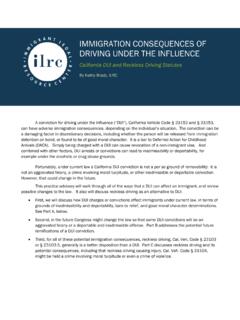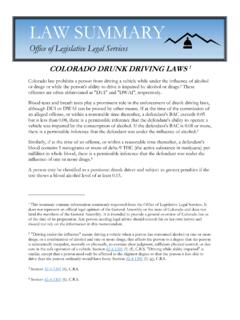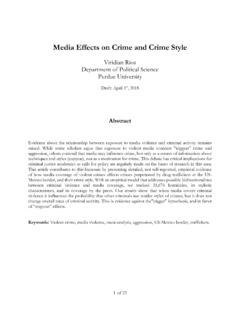Transcription of AN INTRODUCTION TO POLICY IN THE UK - British Ecological …
1 The British Ecological Society (BES) is committed to making the best Ecological evidence accessible to decision-makers. Policymaking processes are rarely straightforward, however, and understanding how best to share their expertise with decision-makers can be challenging for scientists. Our POLICY Guides aim to improve communication between our members and policymakers, increase the impact of Ecological research and support evidence-informed first guide provides an INTRODUCTION to the policymaking process, focusing on the UK Government and Parliament, how policies are developed and the difference between POLICY and POLITICAL SYSTEM IN THE UKThe UK political system is a parliamentary democracy which functions under a constitutional monarchy.
2 The monarch is the constitutional head of state, but acts mainly in a ceremonial capacity. Executive powers, the power to implement and enforce laws, lie with the Government. Government may propose a new law or piece of legislation to give legal underpinning to some or all of a POLICY . The Government is monitored and scrutinised by Parliament, meaning all new legislation must go through Parliament before being passed into law. Parliament also scrutinises existing legislation, Government policies and their IS A POLICY ?
3 A POLICY is a set of principles to guide actions in order to achieve a goal. A government POLICY , therefore describes an objective or course of action planned by the Government on a particular subject. Policies are usually developed by a Government Department, for example the Department for Environment, Food and Rural Affairs (Defra), in order to achieve their objectives. Documentation on government policies is publicly available through the UK Government website ( ). POLICY GUIDEMAY 2017AN INTRODUCTION TO POLICY IN THE UK By Diliff - Own work, CC BY-SA MESSAGES under the UK s constitutional monarchy, the Government runs the country by implementing policies and is held to account by Parliament.
4 A government POLICY is a plan or course of action by the Government. Legislation is law. Policies must always comply with existing law, but may also lead to the proposal of new laws. Some aspects of policymaking and legislation, such as the environment and education, are devolved to the national level (England, Scotland, Wales and Northern Ireland). The processes for formulating, enacting and scrutinising policies are complex and non-linear. POLICY tends to be evidence-informed, presenting opportunities for researchers to provide input and scientific evidence, but is also shaped by a number of other factors, including electoral considerations, public opinion and decision-makers preferences and British Ecological Society is a limited company, registered in England No.
5 01522897. Registered Charity No. 281213 WHERE DO POLICIES COME FROM? Policies may emerge at different points during the political cycle. Some policies may be outlined in party manifestos prior to an election, such as the commitment to a 25 Year Plan to restore the UK s biodiversity in the 2015 Conservative Party manifesto, while others may emerge in response to particular situations or events, such as ash dieback. External organisations and individuals can influence POLICY development at all stages through formal consultation and engagement, or through informal lobbying of Ministers, Parliamentarians, and wider public ARE POLICYMAKERS?
6 For scientific evidence to play a part in informing POLICY development it must be seen and understood by those responsible for making POLICY but who is this? Policymaker is a broad term, encompassing all people involved in formulating, developing or amending POLICY . In the UK, Ministers of Government, their advisors, civil servants, Chief Scientific Advisors, Members of the House of Commons (MPs) and the House of Lords, as well as their staff, all fall under this umbrella. Staff working for government agencies such as Natural England, who tend to have more expert knowledge in the Ecological domain, play a critical role in informing the development of policies.
7 EXAMPLES OF POLICYThe details of a POLICY and the steps needed to meet the POLICY ambitions will often be set out within Government strategies, which are usually developed through stakeholder consultation. These strategies are non-binding in themselves but have often been developed in order to help meet binding objectives and goals, for example, the commitment to reduce greenhouse gases under the Kyoto Protocol. A POLICY may have an associated piece of legislation that helps to enforce part of or all of it.
8 The case study in the final section of this Guide examines the development of the Biodiversity 2020 strategy4, showing how this was shaped by an international commitment to the Convention on Biological Diversity5 (CBD) and involved a major process of stakeholder ARE OFTEN EXPRESSED IN: Government manifestos White Papers, such as the Natural Environment White Paper6 Thematic policies, such as those concerned with biodiversity (see the case study) or with invasive non-native OF LEGISLATION THAT ENFORCES A POLICY : The Wildlife and Countryside Act 1981 is the primary legislation that protects animals, plants, and certain habitats in the UK.
9 It consolidates and amends existing national legislation to implement the Bern Convention8 and the Birds Directive9. This Act also provides for the notification and confirmation of Sites of Special Scientific Interest (SSSIs), which are identified and protected for their flora, fauna, geological or physiographical features10. The UK Climate Change Act 200811 commits the UK to reducing emissions by at least 80% in 2050 from 1990 levels, based on advice from the Committee on Climate Change report: Building a Low-Carbon Economy12.
10 under the United Nations Framework Convention on Climate Change the UK is party to commitments under this BOXWHAT IS THE DIFFERENCE BETWEEN THE UK GOVERNMENT, PARLIAMENT AND THE DEVOLVED ADMINISTRATIONS? The Government (also referred to as the executive ) is responsible for deciding how the country is run and managing the process. The Parliament ( the legislature ) is responsible for monitoring and scrutinising the actions of the Government and passing laws. Parliament is composed of two chambers; the House of Commons, composed of Members of Parliament (650) who have been elected by voters; and the House of Lords, composed of Members who are appointed (around 800).




